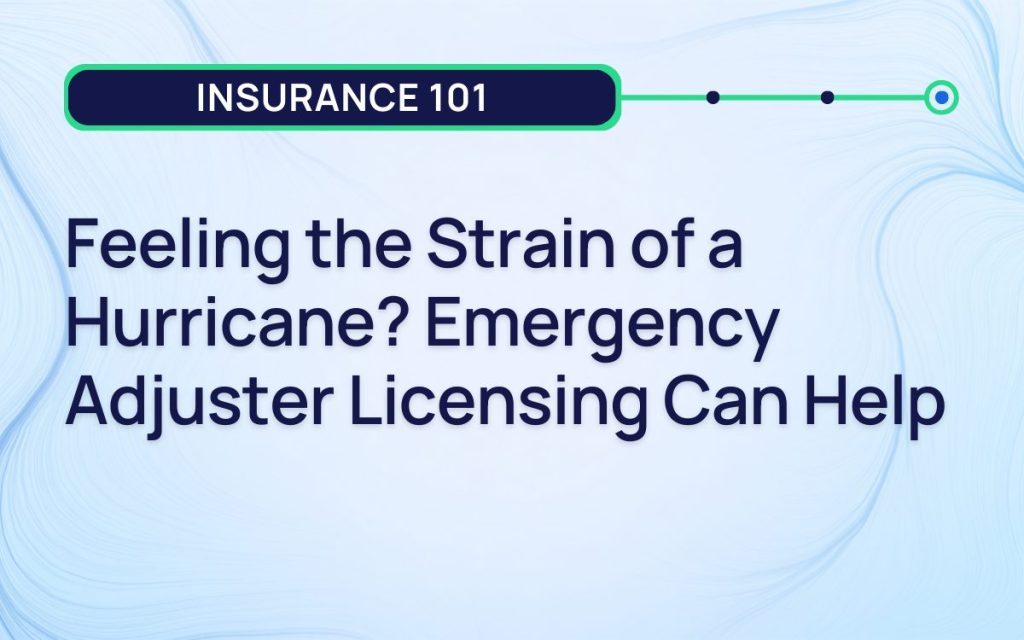Feeling the Strain of a Hurricane? Emergency Adjuster Licensing Can Help

Hurricane season is upon us once again, and while The Band of Heathens isn’t worried, the rest of us are preparing. So as homeowners brace for unprecedented winds and increasing Severe Connective Storm (SCS) surges, insurers brace for their own devastation: a significantly higher volume of claims and insured losses.
Natural catastrophes have been increasing insured losses for decades, reaching over $125 billion in 2022. And with the first half of 2023 already racking up $40 billion in insured losses, things don’t appear to be slowing down. In fact, increased losses coupled with higher rebuilding costs have led a lot of big-name insurers to pull out of riskier, coastline states like California and Florida (but that’s a discussion for another time).
When these climate-related catastrophes hit, claims adjusters are typically some of the first people on the scene. They represent a crucial step in disaster recovery and community rebuilding. But, when a natural catastrophe results in severe, widespread damage, sometimes additional help is required.
Enter the emergency adjuster
Too many losses for a state’s licensed adjusters to handle? Sounds like an emergency. To avoid even greater despair and help communities get back on their feet following a disaster, states can call on the help of emergency adjusters.
What is an emergency adjuster?
An emergency adjuster is any individual who’s otherwise qualified to adjust claims, but isn’t licensed in the state where the catastrophe occurred. This individual may act as an emergency adjuster and adjust only claims arising from the catastrophe. The hope is that by allowing these individuals to help, insurance companies can respond to affected property owners’ needs quicker and more efficiently.
To qualify as an emergency adjuster, an individual has to be a nonresident. All resident adjusters who wish to help will need to follow their state’s normal licensing and registration requirements, regardless of the circumstances. As a resident adjuster of any kind, to be most useful to your resident state in emergencies, your best shot is to generally stay up-to-date with your compliance requirements at all times.
A few notable calls for emergency adjusters this year:
- Fires wreak havoc across Maui
In early August 2023, fires raged across the western coast of Maui, destroying thousands of homes and businesses in the process. As the full extent of the damage became clearer, Hawaii Insurance Commissioner Gorden Ito, authorized the temporary assistance of nonresident independent adjusters to help handle the amount of claims caused by the fires.
- Florida’s preparation for Hurricane Idalia
The call for emergency adjusters doesn’t always happen after a disaster strikes. Just one day before Hurrican Idalia made its landfall on Florida’s Gulf Coast, the Division of Agent and Agency Services activated the state’s emergency adjuster system.
- Heavy rains flood Vermont
Just a month before the Maui fires, Vermont faced catastrophic flash flooding and mudslides resulting in significant property losses. Governor Phil Scott declared a state of emergency that prompted the Commissioner of the Department of Financial Regulation to call on the help of emergency adjusters.
How do you become an emergency adjuster?
While the exact process for becoming an emergency adjuster varies by state, things typically begin with a state government official declaring a state of emergency. From there, the state’s insurance commissioner will issue some sort of bulletin, announcement, or declaration calling for emergency adjusters and outlining the requirements for individuals who wish to help.
In general, the announcement sounds something along the lines of:
“We will temporarily allow nonresident licensed claims adjusters to assist with the high number of insurance claims we are either seeing or expecting to see in the aftermath of this disaster. During this emergency period, nonresident adjusters can legally operate in our state for X amount of days.”
Do you need a license to become an emergency adjuster?
For the most part, yes. Emergency adjusting isn’t a way for individuals to practice claims adjusting without a valid license. It is, however, a way to give quick approval to already licensed, out-of-state adjusters.
During non-emergency situations, any individual who wishes to operate as an adjuster must first complete the state’s licensing requirements, including potentially taking a state-specific exam. But, when time is of the essence (i.e. when there are hundreds of thousands of claims being filed) nonresident (but still licensed) adjusters can be fast-tracked past state-specific requirements and begin helping almost immediately.
Getting an emergency adjuster license without a home state adjuster license, or a designated home state license, is rare. And in case you thought states were just handing out adjuster licenses willy-nilly after a catastrophe, fear not. There are often a few other requirements an individual has to meet beyond their willingness to help.
What are some other emergency adjuster requirements?
Emergency adjuster licensing typically waives examination, fingerprinting, and background requirements, but there are still some hoops to jump through before an emergency adjuster can start helping.
For starters, most states require an applicant to fill out a form with any information the state insurance commissioner deems necessary. This includes:
-
- Personal information. Adjusters wanting to work in a disaster area may be asked to provide personal information such as their name, address, Social Security number, phone number, and more.
- A copy of their home state adjuster license. Some states ask that emergency adjusters provide a copy of their current adjusters license.
- Application fees. While most states don’t charge application fees for emergency adjusters, there are some that do. Fee amounts range based on the state, but rarely do they exceed $75.
- Proof of sponsorship. Perhaps the largest hurdle to getting an emergency adjuster license is securing sponsorship. If you apply as an emergency insurance adjuster, you’ll need to obtain sponsorship with a licensed insurance adjuster or insurance company in the state.
Are emergency adjuster licenses permanent?
No. Emergency adjuster licenses are temporary and typically remain in effect for less than 180 days. The state determines the specific period of time in which an emergency adjuster license is in effect, and is often based on the amount and scope of claims.
While emergency adjuster licensing is meant to be speedy, the process is often overwrought with manual inputs and slow response times. So you can imagine how much more bogged down adjuster licensing is during non-emergency times when even more data collection is required.
Whether you’re sponsoring emergency adjusters after a natural disaster, pre-preparing with bulk adjuster onboarding, or offboarding a large number of adjusters after disaster season winds down, staying compliant is a must. A modern compliance management solution can eliminate the back and forth of tracking down information for background checks, license verification, and other documentation.
See how AgentSync can help you meet your adjusters’ licensing and compliance requirements quicker and more efficiently. Contact us or schedule a demo today.

